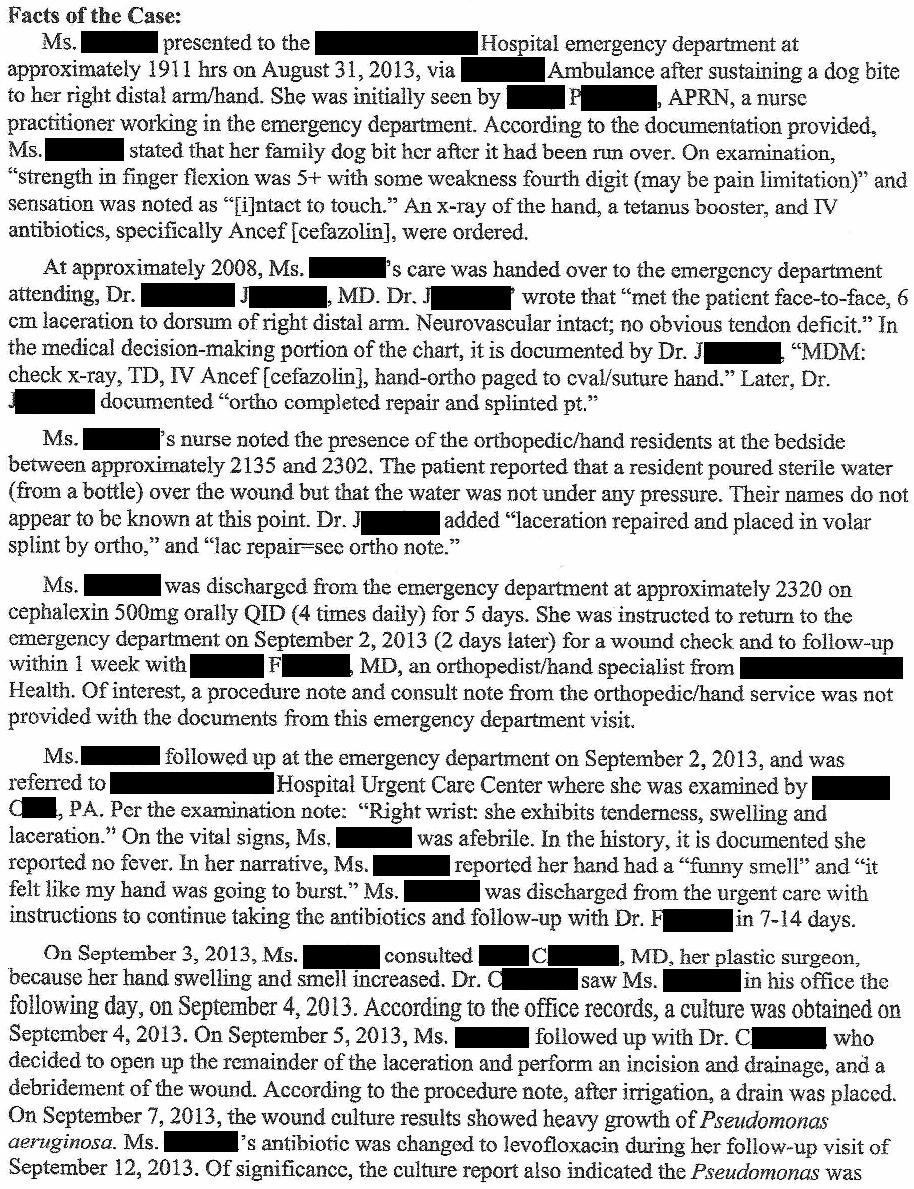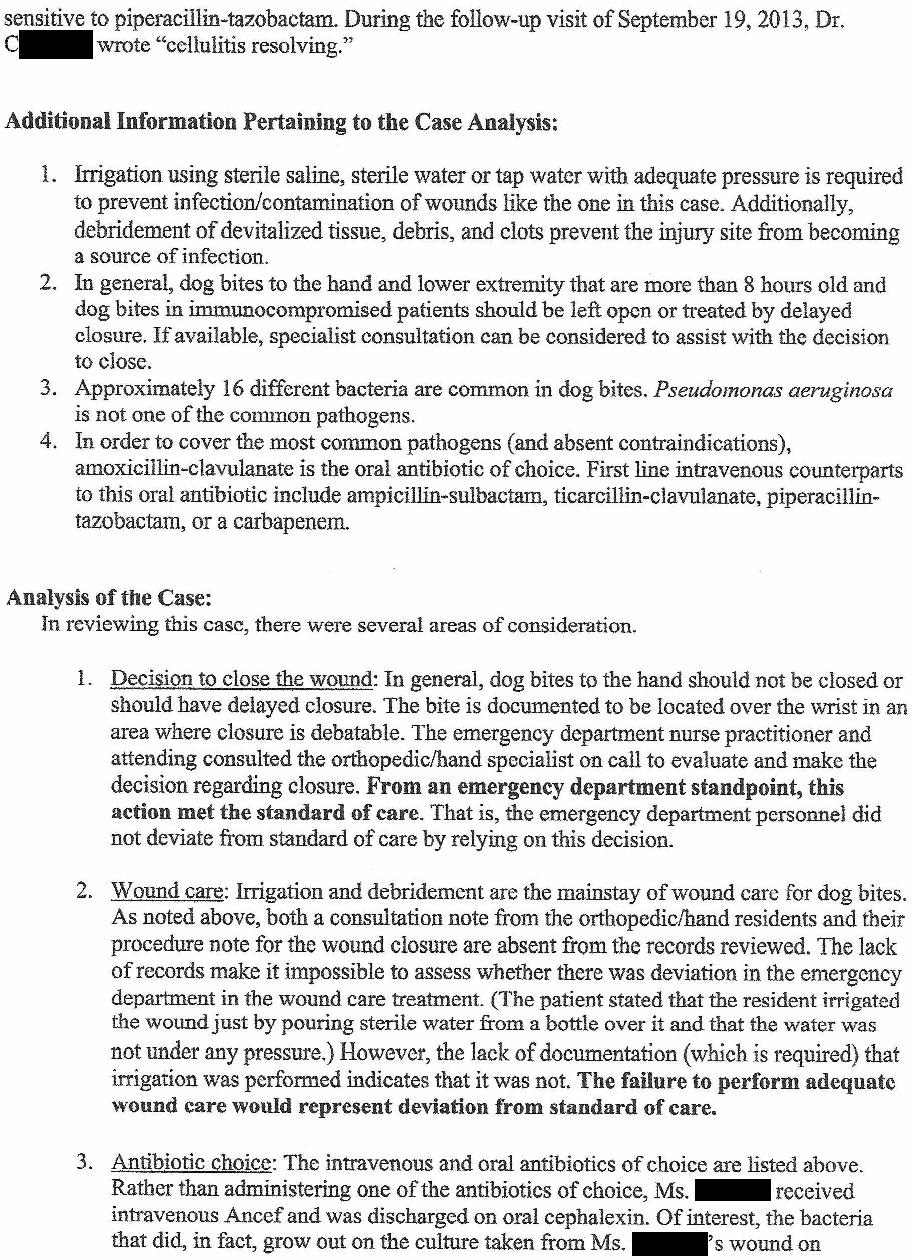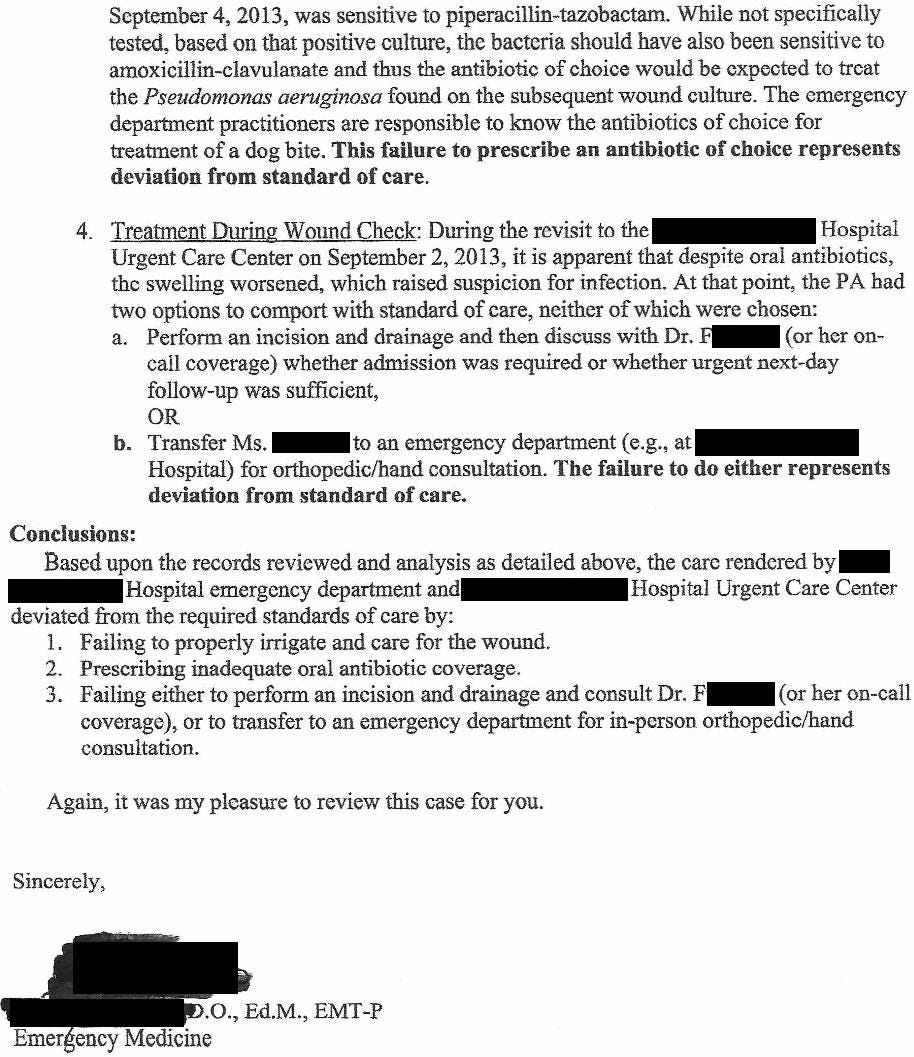A 54-year-old woman presented to the ED after being bitten by her dog.
She suffered a 6cm laceration to her right wrist/hand region.
An xray did not reveal any foreign body or fracture.
The ortho hand service was consulted.
An ortho resident irrigated the wound, sutured the laceration, and applied a splint.
The patient was given a tetanus shot and Ancef.
She was discharged on Keflex and given a referral for a follow-up appointment.
2 days later, she noticed increasing swelling and pain.
She returned to the hospital, but this time went to urgent care.
She was seen by a PA, and discharged with instructions to continue taking the antibiotic.
The swelling continued to worsen.
The patient called a hand specialist (a plastic surgeon who worked in the same hospital system) who she had seen previously.
He removed the sutures, debrided the wound, and placed a drain.
A culture was taken that grew Pseudomonas (sensitive to levofloxacin and piperacillin-tazobactam).
The patient reported permanent disability of her right hand.
She hired a law firm and sued the hospital, the EM physician from the initial visit, and PA from the return visit.
Join thousands of doctors and attorneys on the email list.
The attorney had filed the lawsuit assuming that her plastic surgeon (Dr. C) would be willing to write an expert witness letter.
Unsurprisingly, Dr. C refused to write an expert witness opinion for a plaintiff who was attempting to sue his own hospital and colleagues.
The attorney was running out of time to file an expert witness opinion, but at the last second found an out-of-state EM physician who was willing to write an expert opinion.
The EM physician did not get it to the attorney in time, and it was filed well after the statute of limitations had expired.
Become a medicolegal expert.
Paying subscribers get a new case every week and access to the entire archive of cases.
The defense filed a motion to dismiss the lawsuit.
In addition to missing the statute of limitations deadline, the plaintiff also failed to serve the EM physician (he had moved out of state).
The PA was served, but the plaintiffs did not have an expert opinion from a PA (required in this jurisdiction).
The judge dismissed the lawsuit in it’s entirety.
MedMalReviewer Analysis:
The correct antibiotic prophylaxis for a dog bite to the hand is Augmentin. This is very basic medical knowledge. I would certainly expect any EM physician to know this, which is why I think there was probably some reason that he strayed from the standard treatment. My best guess is that the patient had an allergy to penicillin. However, Keflex would not be a preferred second line treatment. Various sources suggest doxycycline, extended-spectrum cephalosporins, or dual therapy with clindamycin and Bactrim.
A Cochrane review examined the evidence for prophylactic antibiotic treatment of mammal bites. They found that antibiotics did not reduce the likelihood of infection after a dog or cat bite, except in the case of bites to the hand. Applying this review to this case is challenging, because it’s not clear if the bite truly involved the hand. The location of the bite was described at various points as involving the wrist and distal arm. There’s a chance that the Cochrane review actually supported not giving any antibiotics to this patient, depending on how “hand” is defined. However, in actual practice in the US, most dog bites get antibiotics, regardless of location.
It’s very unusual to get a Pseudomonas infection from a dog bite. Less than 2% of dog bites grow Pseudomonas aeruginosa (source). This patient simply had bad luck.
The expert witness claims that Augmentin would have successfully treated the Pseudomonas infection. Unfortunately, this is wrong. Pseudomonas is usually resistant to Augmentin. My suspicion is that the expert reviewed the culture results and saw that the bacteria was sensitive to one penicillin (piperacillin-tazobactam) and wrongly assumed that this meant that it was sensitive to all penicillins.
The fact that this person was allowed to function as an expert is a profound indictment of the way that expert witnesses are used in the legal system. I favor a system that requires review of medical cases before a pre-selected panel of experts before a lawsuit can be filed. While not perfect, this would help weed out many cases that are built on falsehoods propagated by rogue doctors.
This case is a story of utter incompetence on the part of the plaintiff’s attorney. How dumb do you have to be to attempt to hire an expert witness to opine against their own employer and colleagues? Attorneys are human and mistakes happen, but the numerous errors, brainless strategy, and missed deadlines go far beyond reason and indicate complete ineptitude.
Looking to hire an EM doctor?
Use attendingjobs.com to find EM doctors who are looking for jobs.









So, the lady's dog gets hit by a car, causing it to bite her, causing an infection resulting in permanent injury, causing her to hire the world's most incompetent malpractice attorney, causing him to hire an out-of-state "expert" who is clueless about the right antibiotic for pseudomonas. I'd say the root of the problem is that the plaintiff is just about the unluckiest person on earth.
Of note, not a minor detail either considering how malpractice is handled, the literature references supplied by the “expert” are from 2015, two years after the visit in question. Sorry try again. Can’t be used to support the claim. Terrible attorney. Terrible expert.